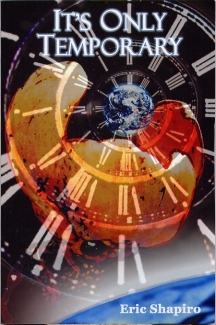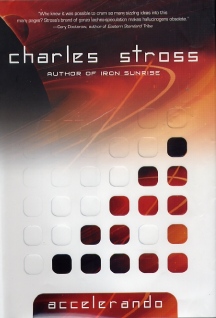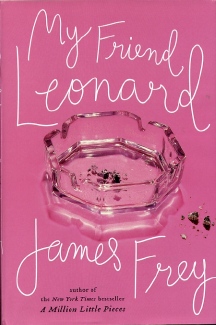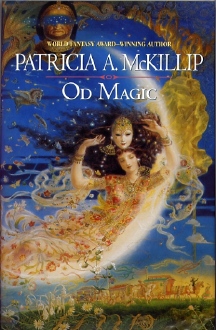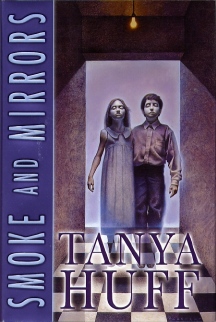|
|
|
This Just In...News from the Agony Column
|
06-03-05: Dont Worry, 'It's Only Temporary' |
|||
Eric
Shapiro Blows Up the World Good
No, somebody usually scrapes by, gets away in a generation-ship Noah's Ark, or sacrifices themselves to save humanity's sorry ass in a dramatic gesture that involves more speechifying than is healthy for the about-to-die. The upshot is that the world or the human race lives another day and disaster is avoided if not averted. Yes, it's all very uplifting, or not, depending on the author's attitude, but it's also very...annoying. It totally ignores the playwriting axiom of Anton Chekov, who said that if a gun hangs from the wall in the first act, it must be fired by the last act. So if your gun is a plague, or aliens, or an asteroid, even though it's useful to the puny humans who populate this planet to see it bypassed, IT'S STILL CHEATING if humans walk away laughing from the apocalypse. What I'm saying here, is bring down the boot, already. Fire the gun. We're all mad as hell and we dont deserve to take it anymore. With 'It's Only Temporary' (Permuted Press ; July 1, 2005; $8.99) Eric Shapiro stops all the messing around and just brings an end to this miserable human race. Meteor. Earth. Splat. Sayonara. That's all she wrote. But it's not all he wrote. Shapiro, who last appeared here with a peculiar but interesting collection of short stories about mental illness titled 'Short of a Picnic', offers a glimpse at one man's last day on earth. Along with everybody else's last day as well. Sean is a recent college graduate, just working at getting his life together. Turns out that's going to be a lot easier than he thought. Shapiro has on offer here a look at a world with just a bit of time to go ape-shit crazy. And he forces his characters to answer a pretty damn cogent question: What do you do in your final days on earth? The problem is that everyone around you is answering that same question, often not in a way that will enhance your ability to pursue your own goals. I'm sure my readers can imagine that a few folks they know might want to just go on one kind of spree or another. Sprees generally involve a fair amount of anti-social behavior, and when everybody is going on one, there are bound to be a few collisions. Violent collisions. I think as a society it's pretty clear we're well beyond the civilized apocalypse on display in Nevil Shute's 'On the Beach'. Come the apocalypse, we will not be sitting sipping cocktails. In fact, to my mind, if everyone were soon going to die, it seems likely that a fair proportion of the population would want to act out on violent, murderous impulses. So what if you move the ending for some folks up a few hours or days? After all -- it's only temporary. Shapiro's book is on the short side -- only 99 pages, but it is very generously printed and blessedly easy to read. Like any smart author these days, he's nabbed the dot com for the title, so you can go to the 'It's Only Temporary' website and check out a chapter or even order the book. If you do order from his website, you get a free short story, and the chance to win an apocalyptic package of books that includes 'I Am Legend' by Richard Matheson, 'Fiskadoro' by Denis Johnson, 'The Stand' by Stephen King, and 'Among Madmen' by Jim Starlin. No Nevil Shute in sight! With luck, you'll have enough time to read them before the end. Dont count on luck, though. The house always wins. |
|
06-02-05: An Advance Look at 'Accelerando' |
||||||
Stross
and the Single Singularity
Are Here OK, take a deep breath. You'll no longer be permitted to breathe. Only meat breathes, and trust me, you're no longer meat. That whole meat thing? You know, flesh of your flesh and the like? Well that was all just a dream. But wait, because it gets a lot worse before it gets any better. Not only was that flesh, your flesh, any flesh you consumed, touched or ogled and anything remotely resembling flesh a dream -- it was NOT the dream of a flesh based-intelligence. It was the dream of a big honkin' machine. And you know what? That machine, studded with little gobbets of flesh that call themselves humans, well that machine was just left over from the computation of a bigger machine that we can't even begin to imagine seeing. Your mind, the one you love so much, the one you think you're using to read this article about a book about machines and minds and all sorts of science fictional whatnots? That mind is the equivalent of mold growing on dog droppings. We are not even the white crumblies. Damn. It is all the Singularity's* Fault. You know how science fiction sometimes seems almost comprehensible? Well, if it is, it ain't science fiction.
Real Science Fiction does not make you "scratch your head". Real science fiction makes you score your scalp. Real science fiction is so manly, it peels your scalp from your skull, "rather like peeling a large orange, " to quote a horror movie. A movie! Movies are so retro! Quaint. Gives you the giggles it does, the idea of "science fiction movies." The very concept is like horse-drawn auto races. It hurts your brain. Charles Stross wants to hurt your brain. In 'Accelerando', he makes a pretty damn good attempt at doing just that. This is not "adventure" science fiction, but it is. This is not "sexy" science fiction, but it is. This is the kind of science fiction that scares normal people. My guess is in general, if you're reading this column, you would at least like to think that you're not normal. You want an electronic kool-aid acid test? Pick up 'Accelerando' and see if you hate it, just hate it. If you do, there's hope for you. If not, then you're not normal. Youre a science fiction-loving geek, and you will experience what Charles Stross and Cory Doctorow termed 'The Rapture of the Nerds' in an Argosy novella. 'Accelerando' will make you geek-out. All hail! So, let's just presume that you think you're manly enough -- or transhuman enough -- to read and enjoy the living shit out of 'Accelerando'. It is, after all, the most pre-acclaimed MasterPiece Card, since, well, hell, I can't think of anything that compares, really. Which is just, because it is either incomparable or incomprehensible. Maybe both. Your call. So, let's say you want to hitch a ride on this whole post-human Singularity bandwagon. Then they are definitely playing your song. No more soft, friendly science fiction here. This is SCIENCE FICTION, filled with sharp ideas that pierce your lips without sterilization or anesthesia. It punctures your puny worldview, unless you currently imagine yourself to be mold growing on a dog dropping. You're going to need a guide, a helper, someone to help you get through it. You're going to need THE MAN HIMSELF, Charles Stross. Happily, he's already created "Singularity! A Tough Guide to the Rapture of the Nerds" on his website with a super-nifty piece of software called Wiki-Tiki-Tavi. No wait, it's TiddlyWiki. OK. Whatever the hell it is, it's the kind of thing you look at and say: "Cool." Say it. Just say it. "Cool." Oh, so cool. You are too, even if you are mold growing on a dog dropping. The first step towards growing is to accept your own mold-hood. The machine awaits you. It is SCIENCE FICTION. MANLY SCIENCE FICTION. Even if you're a girly-girl, you read this, it's GIRLY-GIRL MANLY SCIENCE FICTION. It kicks ass, it takes no prisoners, it waits for no one, uses no CPU cycles for six months. The Pre-Approved MasterPiece Novel. Six months, no cycles. Then it EATS YOUR BRAIN. |
|
06-01-05: James Frey Follows Up with 'My Friend Leonard' |
|||
Crackhead
to Bag Man to Husband
That was when a cover caught my eye. 'A Million Little Pieces', eh? I can see my hand now reaching toward the book with a cover that shows a glazed hand, covered with multi-colored sprinkles reaching for, for -- the blue. The title. The author's name. Did I want to read this first book, a memoir, written in dense prose with imposing blocks of text? Did I want to talk to the guy? I hemmed and hawed for a moment and made the decision. Yes, I wanted to talk to the guy, and yes, I'd read the book. Cut to the interview, a great, intense conversation with a charming but tense and intense guy, James Frey. KUSP seems somehow different than it is in that memory, though there's been no change. Except in me. As regards the interviews, I'm no longer a bundle of tension, and I'd credit Frey with being one of my first non-toe-curling interviews. Back then, the website was barely a year old. Now it's what, three and half years old. That's still pretty new, but, what the hell. Seems like a lot of life has passed in the intervening years. Intervening years, I might add, during which I've been waiting quite patiently for Frey's follow up. No more patience required. "My cup runneth over," Frey tells us in an epigraph. I bet. In the opening paragraph of the book, Frey is in jail and gets hit upside the head by a gent named "Porterhouse". From there we follow our favorite self-destructing tough guy as he seeks the help of a mob boss named Leonard, with whom he did detox time in 'A Million Little Pieces'. The mix of life here seems a bit more varied than in 'A Million Little Pieces', and I'm wondering how his hard-boiled style will work when he's talking about his wife, his child, and Hollywood success. One hopes he can walk that tightrope, but I've got to admit that I'm worried for Frey as a writer. Will he overreach? Will he manage to stay sober throughout the book? Will a sober and unwound Frey be as compelling as the guy getting pounded on page one? I took a chance before and it really paid off. 'A Million Little Pieces' was an utterly unexpected and memorable reading experience. I'll take that chance again. After all, if Frey's a different person now, then so am I. Older, not wiser, a bit less tense. A bit. |
|
05-31-05: Patricia A. McKillip 'Od Magic' |
|||
Gods
and Gardeners
Leave it to fantasist Patricia A. McKillip to put a gardener at the center of her new novel, 'Od Magic' (Ace / Penguin Putnam ; June 7, 2005 ; $22.95). McKillip is one of our most unusual and certainly one of our premiere fantasists, a writer who happily operates in her own very unique world while managing to write about many worlds in her novels. She manages a remarkable consistency from novel to novel without having to write a series of novels. Her work is a feat that itself might be the subject of a fantasy novel. 'Od Magic' is the story of Brendan Vetch, a man with a gift. What's nice is that we all know someone like Brendan, someone who just seems to know what plants will grow where, someone who knows which plants are prescriptions and which are poisons. Yes, you might joke about talking to plants, but I'm sure that you know someone who is a bit spooky with regards to their ability to "Call Any Vegetable, call it by name!" as Frank Zappa and the Mothers of Invention once so memorably sang. "And the vegetable will respond to you..." They certainly do to Brendan, who himself gets called by the great Wizard Od. She needs a gardener for her school in the great city of Kelior, where potential wizards are trained to serve the Kingdom of Numis -- or be punished should they break the law. Of course, Brendan himself does not know the power he commands, and how he will tip the balance. McKillip offers readers the highest quality prose, imaginative situations and detailed characterizations. Her imagination stays well within the zone of comfort and her books have a hint of romance about them but never go the distance into anything unpleasantly coercive. She's an utterly dependable presence in the fantasy field. She's remarkably consistent with enough verve to make each of her books distinguishable. In recent years, she's managed an incredibly difficult trick in this genre. She's written novel after novel and never, ever succumbed to Sequelitis. Ace and Penguin-Putnam have done well by her, offering each of her novel in a nice compact hardcover edition with gorgeous wraparound dust jacket art by Kinuko Y. Craft. Craft's work with McKillip seems at this point on the verge of collaboration. She captures the detailed, fantastic aspects of McKillip's work as well as the more mundane, character-oriented aspects that make McKillip such a treasure. If you disbelieve me, take a look at Craft's website, where you can see her incredible talents on display. Any reader who owns them all could easily decorate one wall of a room with framed versions of the dust jackets for the recent McKillip books. Now, this does not mean that McKillip is for everyone. If youre only in it for the monsters, for the fighting, for the blood and the swords and the politics, then you might take note that McKillip's work eschews all those standards and aims for a different target, a target it hits squarely every single time. McKillip is one of those quiet but intense powers in the world of genre fiction. There's no telling if or when shell impinge upon the mainstream. To my mind, it would only take one slight nudge -- say a super-high quality movie based on one of her novels -- to send her regularly onto the bestseller lists. She has the kind of consistency that is required to make a keep herself there. Of course, the chances of a well-executed sympathetic adaptation of her work are not great. Until then, readers of this column can put her happily in their undiscovered treasure box. Take out her books and set them in a row on your shelves. Very nice, and nice memories of reading. "And the vegetable will respond to you!" |
|
05-30-05: Tanya Huff Looks Through 'Smoke & Mirrors' |
|||
Nobody Escapes the Vampire Epic
Well something has to explain it. Because vampire epics are rapidly becoming more universal than love stories. Look around. Do you see a lot of evidence of lot at work in the world? People helping one another selflessly, devoting themselves to others? Walks in the park? Now, take a look around for vampires. Do you see people exploiting one another to death? How about draining one another of vital resources. Forget blood -- you can sell blood. The vital resource being sucked dry around the world is money. Cash vampires are bleeding us dry every day. It's enough to make you want to go to the movies and see a love story, just to get away from all the real vampires. But in case you feel you need to face the reality head-on, to plunge yourself into the dynamics of this world, then Tanya Huff is there to serve you, with another vampire epic in her Henry Fitzroy, vampire detective series. 'Smoke and Mirrors' (DAW / Penguin Putnam ; June, 2005 ; $24.95) is the latest entry, and just to ensure total topicality, to make this novel practically "ripped from the headlines" spooky child ghosts make the cover. Those ghost kids are just some of the unrestful inhabitants of the house where Fitzroy and his partner Tony Foster, a one-time street kid trying to make good, find themselves employed. Foster and Fitzroy are quote providentially hired to work on the production of Darkest Night, a show about an, uh....vampire detective. It's a case of fiction echoing fact, no wait, fiction echoing fiction that's based on fact, no wait... I'm sorry, I just got lost in my own hall of mirrors. The fact is that Fitzroy is one of Huff's most popular heroes, and this means that his fans should start lining up now to get in on the summer fun. And just in case you aren't clued in to the Fitzroy series, here are the previous novels, so you can drain them of their life before taking on this latest entry. 'Blood Prince', 'Blood Trail', 'Blood Lines, 'Blood Pact' and 'Blood Debt' all feature Fitzroy, a bastard son of Henry the VIII and a romance writer. Wait, are those two related? Is "bastard son of Henry VIII" a sort of job qualification for "Romance writer"? Well, both Henry and vampires exhibit an unhealthy interest in necks. But how does that connect to romance writing? Of course! It's the universal nature of neck loving. Or blood draining. Or, more likely, page-turning pulse-pounders that offer a soupcon of the supernatural leavened with just enough romance to make things seem unreal. How did we come to this point, to the point in our collective popular-fiction lives where vampires provide the reality and love interests the fantasy? Oh, we're a mixed people, we are. But at least we're smart enough to know where our best interests lie. Sure, we'll read the real stuff, David Sedaris essays on the little things in life we all share. We'll read the big stuff in the newspaper and pay more attention to the comics. And when we want to face reality, when we want to look the world straight in the eye -- we'll read vampire epics. |
